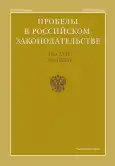Forensic investigation of explosives and explosive devices, innovations in forensic explosives expertise, the use of 3D modeling in expert research
- 作者: Lozinsky O.I.1
-
隶属关系:
- Russian Presidential Academy of National Economy and Public Administration
- 期: 卷 17, 编号 6 (2024)
- 页面: 150-157
- 栏目: Criminal Law Sciences
- URL: https://journal-vniispk.ru/2072-3164/article/view/279854
- EDN: https://elibrary.ru/ITLXTI
- ID: 279854
如何引用文章
详细
The purpose of the study. The article analyzes the concepts, classification and forensic characteristics of explosives and explosive devices. As part of the scientific work, the innovative possibilities of forensic explosive expertise, including forensic explosive situational expertise related to the use of 3D modeling of the circumstances of the explosion (the scene and the dynamics of what is happening), have been studied and analyzed. Conclusions. Explosives and explosive devices continue to be means of increased danger (outside the criminal sphere: in industrial, construction, mining, etc. areas) and one of the most effective and frequently used by the criminal community (including terrorist organizations) means of realizing illegal intentions and illegal activities in general. One of the most effective and objective means of proof in criminal cases, where explosives and explosive devices are used as a means of crime, is the conclusion of an expert in forensic explosive expertise. Currently, one of the most innovative types of these examinations is forensic explosive situational expertise related to the use of 3D modeling of the circumstances of the explosion.
关键词
作者简介
Oleg Lozinsky
Russian Presidential Academy of National Economy and Public Administration
编辑信件的主要联系方式.
Email: oleg.lozz@yandex.ru
SPIN 代码: 3389-3371
Cand.Sci.(Law), Associate professor of the Procedural Law Department; South Russian Institute of Management
俄罗斯联邦, Rostov-on-Don参考
- Bashkatov S.M. Forensic explosive expertise: methodological foundations and empirical experience. // Eurasian Law Journal. 2023. No. 2. pp. 141-147.
- Bergman D.I. Explosive devices: concepts, forensic characteristics, unmasking signs // Bulletin of the Belgorod State University. 2024. No. 1. pp. 114-118.
- Bryleva K.V. Explosives: damaging factors and their characteristics // Bulletin of Kemerovo State University. 2023. No. 4. pp. 49-56.
- Baranov R.A. Appointment of an explosive expertise in the investigation of a murder committed using an explosive device // Young Scientist. 2023. No. 9. pp. 91-97.
- Verbitskaya V.A. Application of electronic digital technologies in the production of explosive examinations // Eurasian Law Journal. 2022. No. 7. pp. 68-70.
- Gofarov Ya.M. Criminalistic characteristics of explosive devices: concept, configuration, principles of action // Forum of young scientists. 2023. No. 4. pp. 39-43.
- Govorov P.N. Expert research on the facts of the ATM explosion: the explosive aspect, problematic issues and ways to resolve them // Bulletin of Kemerovo State University. 2022. No. 3. pp. 79-86.
- Dashko L.V. The use of 3D modeling capabilities in the production of explosive research // Forum of Young Scientists. 2023. No. 4. pp. 39-43.
- Dolzhenko N.N. Evidentiary possibilities of forensic explosive expertise: a range of applications, solvable issues // Legal science and practice. 2022. No. 3. pp. 57-63.
- Zinchenko S.V. Potential and promising evidentiary possibilities of explosive expertise in criminal proceedings // Society: politics, economics and law. 2022. No. 4. pp. 71-77.
- Novikova V.N. Innovative possibilities of forensic explosive expertise at the present stage in the investigation of man-made disasters containing criminogenic signs (criminal negligence, inaction) // Russian investigator. 2022. No. 5. pp. 209-214.
- Pepekin V.I. Trends in the development of explosives research // Chemical Physics. 2020. No. 12. pp. 108-116.
- Serafimovich S.D. Explosives: the concept, types, criminalistic characteristics, unmasking factors // Forum of Young Scientists. 2023. No. 1. pp. 97-103.
- Fedorov A.Yu. Evidentiary possibilities of forensic explosive situational expertise using the method of 3D modeling of explosion circumstances // Legal science and practice. 2024. No. 1. pp. 67-74.
- Kharchenko I.V. Theoretical and methodological aspects of the application of the laser emission spectroscopy method in explosive expertise // Bulletin of the VIPK of the Ministry of Internal Affairs of Russia. 2022. No. 2 (62). pp. 60-68.
- Shuvalova I.D. Forensic expert assessment of explosives, explosive devices, and the possibilities of their criminal use // A Russian investigator. 2023. No. 4. pp. 116-123.
- Ekman G.N. Using the 3D modeling method in the production of forensic ballistic examination: concept, methodology, empirical developments // Society: politics, economics and law. 2023. No. 5. pp. 141-147.
补充文件








